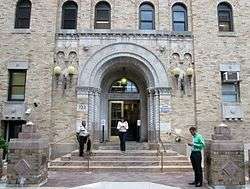Columbia University Mailman School of Public Health
Mailman School of Public Health, is the public health graduate school of Columbia University. Located on the Columbia University Medical Center campus in the Washington Heights neighborhood of Manhattan, New York City, the school is recognized by the Council on Education for Public Health.
| Type | Private Graduate school School of Public Health |
|---|---|
| Established | 1922 |
Parent institution | Columbia University |
| Dean | Linda P. Fried |
Academic staff | 500 |
| Students | 1,404 |
| Alumni | 12,000 |
| Location | , United States |
| Website | mailman |
The Mailman School is considered a preeminent school of public health in the United States. The school began in 1922 as the DeLamar Institute of Public Health.[1] It became an official school within the university in 1945. In 1999, following a $33 million grant from the Joseph L. Mailman Foundation, the school was renamed the Joseph L. Mailman School of Public Health.[2]
The school is ranked among the top public health schools in the nation by the U.S. News & World Report.[3] Currently, the school enrolls over 1,400 students and is one of the largest recipients for sponsored research pertaining to public health.[2]
History

In 1918, Columbia University's College of Physicians and Surgeons received a $5 million endowment from the estate of mining magnate Joseph DeLamar to establish an educational program in public health, which led to what would become the School of Public Health.[4] The DeLamar Institute of Public Health opened its doors at Columbia in 1922 and the following year began offering the Master of Science in Public Health degree.[5] In 1940, the Doctor of Science of in Public Health degree was offered for the first time.[4][5]
On July 1, 1945, the designation of "Institute of Public Health" was changed to the "School of Public Health" by the Trustees of Columbia University.[6] In 1946, the School of Public Health began offering the Master of Public Health degree, in addition to the Master of Science and the Doctor of Public Health degrees.[6] In 1967, the Psychiatric Epidemiology Training Program was established, followed in 1972 by the award of a T32 training program to psychiatric epidemiologist Bruce Dohrenwend from the National Institute of Mental Health (NIMH), which continues today.[7] A Doctor of Philosophy (Ph.D.) program in epidemiology was also established.
In 1998, the Mailman Family Foundation endowed the school with $33 million, at the time the largest gift ever given to a school of public health. The school was renamed the Joseph L. Mailman School of Public Health in recognition of the businessman and philanthropist.[8][5]
In 2012, the school redesigned and implemented a new Master of Public Health (MPH) degree to meet global health challenges, which has since become a model at other schools worldwide.[9][10]
The Center for Infection and Immunity comprises three floors of the Mailman School. It is led by W. Ian Lipkin, who has been lauded by National Institute of Allergy and Infectious Diseases director Anthony S. Fauci, and is known as a "master virus hunter" due to his speed and innovative methods of identifying new viruses. From the onset of the COVID-19 pandemic, 50 to 60 CII researchers began collaborating with researchers at Sun Yat-sen University in China. Dr. Lipkin had advised the Chinese government and the World Health Organization (WHO) during the 2002–2004 SARS outbreak, for which China awarded him its highest honor in January 2020.[11][12]
Educational programs
The Mailman School offers MPH, MHA, MS, PhD, and DrPH (Doctor of Public Health) degrees. The school's educational offerings include 10 dual degree programs with other schools at Columbia University.
Faculty
Linda P. Fried serves as dean and DeLamar Professor of Public Health at the Mailman School. A researcher of healthy aging and longevity, her work helped define the syndrome of frailty. She designed Experience Corps, a program in 22 cities that puts older volunteers to work in public schools, yielding benefits to all generations. Fried has been recognized by Congress as “a living legend in medicine”.[13]
More than 470 faculty members work in over 100 countries, as well as in the Northern Manhattan community. Their research areas include climate and health, HIV/AIDS treatment and prevention, healthy aging, maternal health, mental health, environmental toxins and children's environmental health, climate and health, epigenetics, the human microbiome, the history and ethics of public health, healthcare reform and how to strengthen healthcare systems, among many other critical issues.
Department chairs
- Biostatistics - F. DuBois Bowman, PhD
- Epidemiology - Charles Branas, PhD
- Environmental Health Sciences - Andrea Baccarelli, MD, PhD, MPH
- Health Policy and Management - Michael S. Sparer, PhD, JD
- Population and Family Health - Terry McGovern, JD
- Sociomedical Sciences - James Colgrove, PhD (interim)
Student demographics
- 1,404 students
- 86% master's students
- 14% doctoral students
- 44 states represented
- 52 countries represented
- 23% non-U.S. citizens
- 46% ethnic/racial minorities
Employment
Six months after graduation, 96% of its master-level graduates were employed in public health or health care (88% of respondents) or continuing their studies in graduate school (8% of respondents).[14] Of the remaining 4% of graduates, half were not seeking a job by choice and only 2% of the respondents were still seeking. The overall average salary 6 months after graduation was $77,495 annually.[14]
International Longevity Center
Organized in 1990 by Robert N. Butler, M.D., professor of Geriatrics at Mount Sinai School of Medicine, The International Longevity Center (ILC) is a not-for-profit, nonpartisan research, policy and education organization whose mission is to help societies address the issues of population aging and longevity in positive and constructive ways and to highlight older people's productivity and contributions to their families and to society as a whole.
In 2011, honoring the wishes of the late Butler, the mission, work, and the assets of the ILC became the foundation for an interdisciplinary center on aging at Columbia University, anchored at the Mailman School of Public Health.
The climate and health program
The Mailman School houses the Global Consortium on Climate and Health Education, a global network of 300+ Universities committed to educate their students on health impacts of climate change. The school houses the only climate and health training program funded by the National Institutes of Health for doctoral students and postdoctoral trainees, and has a Master of Public Health certificate program in Climate and Health.
Epigenetics and Precision Medicine at the Mailman School of Public Health
Since 2017, the Mailman School offers a summer Epigenetic Boot Camp for Planning and Analyzing DNA Methylation Studies, a two-day intensive boot camp of seminars and hands-on analytical sessions that provides an overview of concepts, techniques, and data analysis methods utilized in human epigenetics studies.[15]
The Laboratory of Precision Environmental Biosciences, regarded as one of the pioneering epigenetics labs worldwide, is the central focus of a wider Precision Medicine program at the Mailman School, focusing on public health and prevention.[16] That includes research and education on the human microbiome, extracellular RNA communication, molecular epidemiology, genomics, viromics, mitochondriomics, statistical genetics, computational biology, and biomarker sciences. Precision Medicine offers a unique combination of cutting-edge lab technology with large scale studies and applications in population sciences and public health, including predictive analytics and analysis of return on investment.[17]
Facilities
The Mailman School of Public Health's main facility, the Allan Rosenfield Building, was constructed in 1930 at 1050 Riverside Drive in 1930 on the Columbia University Medical Campus. It served as the original New York State Psychiatric Institute until it was moved to a nearby newly constructed facility in 1998. The building is named after Allan Rosenfield, a long-time dean of the Mailman School who was referred in The New York Times as a "giant in the world of public health."[18] Renovation work on the building included increased sustainable features.[19]
Notable alumni
- Chelsea Clinton
- Joseph L. Fleiss
- Tom Frieden
- Brian Lehrer
- Ilan Meyer
- Robert Lewis Morgan
- Ernest S. Tierkel
- Christy Turlington[20]
- Yvonne Thornton
- Chandra Ford
See also
References
- "MPH Program Rankings".
- "Quick Facts". Columbia University. Archived from the original on 2008-02-09. Retrieved 2008-02-22.
- 2015 Ranking of Best schools of Public Health in US by U.S. News & World Report.
- Annette B. Ramirez de Arellano1; Samuel Wolfe. ""For the Study of Disease and the Prevention Thereof..." : Origins of the Columbia School of Public Health" (PDF). Aje.oxfordjournals.org. Retrieved 28 November 2017.
- Columbia University. School of Public Health and Administrative Medicine. "Columbia University bulletin of information : the DeLamar Institute of Public Health : announcement". New York City : The University. Retrieved 28 November 2017 – via Internet Archive.
- Columbia University. School of Public Health and Administrative Medicine. "Columbia University bulletin of information : the DeLamar Institute of Public Health : announcement". New York City : The University. Retrieved 28 November 2017 – via Internet Archive.
- "The Columbia University School of Public Health 75th Anniversary Issue" (PDF). American Journal of Epidemiology. The Johns Hopkins University. 147. February 1, 1998. Retrieved 28 November 2017.
- Columbia University. School of Public Health and Administrative Medicine. "Columbia University bulletin of information : the DeLamar Institute of Public Health : announcement". New York City : The University. Retrieved 28 November 2017 – via Internet Archive.
- Galea, Sandro; Fried, Linda P.; Walker, Julia R.; Rudenstine, Sasha; Glover, Jim W.; Begg, Melissa D. (March 2015). "Developing the New Columbia Core Curriculum: A Case Study in Managing Radical Curriculum Change". American Journal of Public Health. 105 (Suppl 1): S17–S21. doi:10.2105/AJPH.2014.302470. ISSN 0090-0036. PMC 4339984. PMID 25706010.
- "Dean Galea Honored with Top APHA Award | SPH | Boston University". School of Public Health. Retrieved 2017-08-05.
- Zimmer, Carl (November 22, 2010). "A Man From Whom Viruses Can't Hide". The New York Times. Retrieved March 24, 2020.
- Kim, Elizabeth (February 3, 2020). "NYC Team Led By Scientist Who Advised On "Contagion" Is Racing To Unlock The Coronavirus. Here's What They Told Us". Gothamist. New York Public Radio. Archived from the original on February 4, 2020. Retrieved March 24, 2020.
- "Indiana University Northwest briefs". The Times of Northwest Indiana. 2008-11-06. Archived from the original on 2015-12-12. Retrieved 2015-12-12.
- "Facts and Figures | Columbia University Mailman School of Public Health". www.mailman.columbia.edu. Retrieved 2017-08-05.
- "Epigenetics Boot Camp: Planning and Analyzing DNA Methylation Studies | Columbia University Mailman School of Public Health". www.mailman.columbia.edu. Archived from the original on 2017-06-22. Retrieved 2017-08-05.
- "3 Pioneering Epigenetic Labs: Exploring the People and Discoveries that Transcend the Lab Walls | What is Epigenetics?". What is Epigenetics?. 2016-07-28. Retrieved 2017-08-05.
- "Public Health, Precisely | Columbia University Mailman School of Public Health". www.mailman.columbia.edu. Retrieved 2017-08-05.
- https://kristof.blogs.nytimes.com/2008/10/16/remembering-allan-rosenfield/
- "Columbia University Medical Center - Allan Rosenfield Building". Vidaris.
- Mailman School Student and Former Supermodel Christy Turlington Burns Makes Directorial Debut with Film on Maternal Mortality | Population & Family Health | Population & Family Health | Mailman School Archived April 27, 2014, at the Wayback Machine. Mailman.columbia.edu. Retrieved on 2013-09-07.
External links
| Wikimedia Commons has media related to Mailman School of Public Health. |
- Official website
- Public Health Rankings
- International Longevity Center
- Laboratory of Environmental Precision Biosciences
